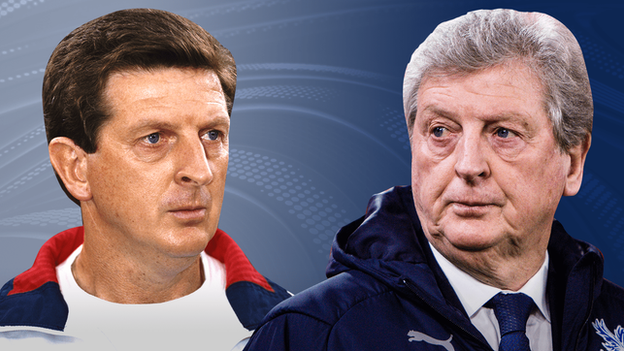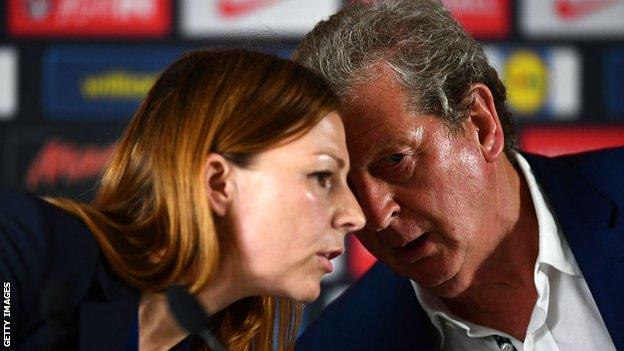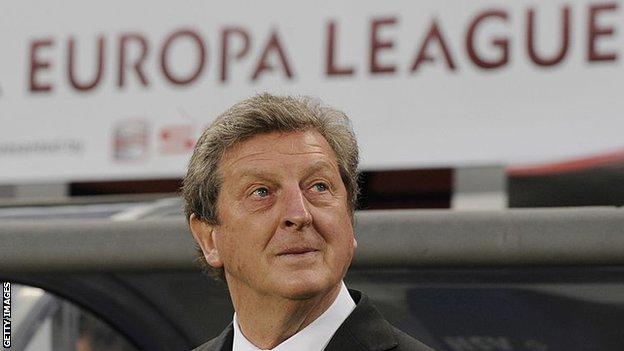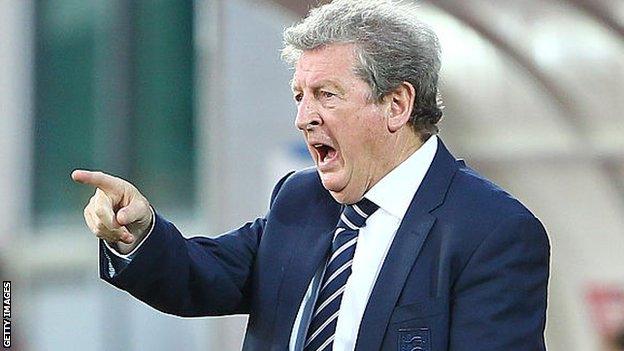Roy Hodgson: The Premier League's oldest manager - by those who know him best
- Published
- comments


Roy Hodgson is in charge of his fifth Premier League club - only Mark Hughes (six) and Sam Allardyce (seven) have managed more
Roy Hodgson deserves to be recognised as "one of the great English coaches", according to former England defender Gary Neville.
But for the first 31 years of his career, the Crystal Palace manager barely registered on the radar in his home country.
His one job in England had been at Bristol City - an unremarkable four-month spell in 1982 which ended with his departure before the club's relegation to the fourth tier.
Fifteen years later, he would pitch up at Blackburn Rovers, and - after another ill-fated stint despite an encouraging first season - would then return to a globetrotting existence.
It was not until his time at Fulham, when he led them from the brink of relegation to the 2010 Europa League final, that he really cemented himself as a regular presence on the British managerial scene. This despite working in Sweden, Switzerland, Italy (where he was twice in charge of Inter Milan), Denmark, the United Arab Emirates and Finland in the intervening years.
He has since gone on to manage Liverpool, West Bromwich Albion, Palace and, of course, England. There have been dizzying highs and painful lows.
On Saturday Hodgson overtook Sir Bobby Robson as the oldest man to manage a Premier League game when, at the age of 71 years and 198 days, his Palace side ran out resounding winners at Leicester.
Before that game we spoke to some of those closest to him during his time in England - and the man himself - to find out how someone who reads Chekhov and likes opera has sustained himself at the top level for so long.
'After England, we'd meet for breakfast every Friday'

England's defeat by Iceland at Euro 2016 led to Hodgson's immediate departure as manager
Hodgson's four-year England tenure ended with an infamous Euro 2016 last-16 exit to minnows Iceland. He memorably said "I don't know what I am doing here" when he appeared at a media briefing the next day, because he felt his statement in resigning after the defeat the night before had been "sufficient". Those events led many to suspect Hodgson was finished in football - either because he would not want to return or because he would be tainted by the end of his Three Lions reign.
Ray Lewington, who worked as Hodgson's assistant with Fulham, England and now Crystal Palace: When you are England manager, you get battered, absolutely battered.
I always remember we went to the Houses of Parliament to meet some MPs prior to going to the World Cup in 2014 and seeing all these famous faces - household names. They all stopped and turned. Probably after the prime minister, Roy was the most famous face in England. It stops everything.
After England, we used to meet for breakfast on a Friday for a year or so, not far from my house. It was me, Roy and Andy Scoulding, who was one of the analysts.
Some of it was to talk about football but really it was just talking about life. It was a couple of hours between 10 and midday. It became a regular thing.
I was all for not doing anything again, I must admit. But after we were doing this for four or five months, he started just throwing in the occasional: 'Do you know what Ray? I quite fancy going in again.' I am saying to him: 'I am not sure, Roy.' He said: 'I don't know, I might start looking around.' It was gradual.
Former Football Association technical director Dan Ashworth: I am not surprised he has rebuilt his career after the way it ended with England but I do give him massive credit. The easy thing would have been to disappear off into retirement.
Roy came back into the Premier League and took over Crystal Palace in a really difficult moment when they looked almost certain to go down, kept them up quite comfortably and is doing a good job this season.
It doesn't surprise me because of his enthusiasm for the game. He lives for football. I remember driving him to watch a game in the Netherlands and being in the car with him for hours and hours on end. He is so passionate about the game. The best I can say is I really hope I am like that when I am his age.
'He was ahead of his time - others have copied his methods'
Hodgson's first shot at Premier League management came with Blackburn Rovers in 1997, taking over the team that had won the top-flight title two years earlier. He was a relative unknown in England at the time, even admitting that season that he "knew very little", external about some of his players, including striker Chris Sutton, who had joined the club in 1994 for a British record £5m. Under Hodgson, Blackburn finished sixth and qualified for the Uefa Cup, but he was dismissed in November 1998, having earlier that year turned down the chance to discuss becoming Germany manager., external
Former Blackburn striker Chris Sutton: When he arrived at Blackburn, there were not many foreign managers in the Premier League - Arsene Wenger at Arsenal and Ruud Gullit at Chelsea were the only two. It was dominated by British and Irish managers, but Roy was different from them because he had made his name abroad.
He had worked up a brilliant reputation. It was big enough for us Blackburn players because he had just been at Inter Milan. But it is on the training ground where you win the players over and earn their respect. Roy did that straight away.
It was like nothing I had seen until then. He had everything down to a tee in relation to where the ball was and where the defence should be as he moved the ball across the backline. And this was just his first session.
Also, he was the first manager I had played who implemented double sessions. As you can imagine, among the players there was quite a mixed reaction but, because we started well, and won four of our first five league games, everyone bought into it.
It was the first time in my career where we did structured 11 v 11 games in training. Every team does it now, but Roy was ahead of his time.
'He performed a football miracle'

Fulham overcame Juventus and Shakhtar Donetsk to reach the 2010 Europa League final - the only major European final in the club's history
After Hodgson was sacked by Blackburn in 1998, it was nine years before he returned to England. He took charge of a Fulham team seemingly destined for relegation. On 26 April 2008, they trailed 2-0 at Manchester City at half-time, and results elsewhere meant the club would be relegated that day unless they won. Remarkably, the Cottagers fought back to beat City 3-2, survived on the final day and, two years later, were taking Atletico Madrid to extra time in the Europa League final.
Lewington: That was as close to a football miracle as you can get. I was there prior to Roy coming to Fulham. We were down. It doesn't matter what the facts and figures say. We were hopeless. When they sacked Lawrie Sanchez and Roy came in, none of us had any expectation of staying up. We didn't think the team was good enough.
Roy lost his first three league games, so we were going deeper into it. But over the next period, just purely by how he coaches, we improved. Basically you are doing the same session every day. The players weren't happy with it at first but he said: 'When we can actually go out and beat teams, I will change the schedule. Until then, we are going to get organised.'
We did it day in, day out. I had never seen it before and I thought it wasn't going to work. But, gradually, you saw us improve. We got within touching distance of escaping and then the Manchester City game was a fluke. It was like a fairytale.
Then, with very little help during the summer - we spent £8m-£10m, nothing ridiculous - the team finished seventh. We had some really good players but none that would be headline makers. They gave their all in training and they were moulded into a team. It was the fact that at any given moment a player would know where his options were because it was so mechanical. The following year, we got to the Europa League final.
'Being a diplomat may have been his downfall at Liverpool'
After his success at Fulham, Hodgson was finally offered the chance to take charge of one of England's biggest clubs when he was appointed Liverpool manager in July 2010. He was sacked the following January - his spell regarded by Liverpool fans as a dismal failure. Unfortunately for Hodgson, he walked into Anfield at a particularly difficult time. His predecessor, Rafael Benitez, had become a club legend by winning the Champions League, while another, Kenny Dalglish, wanted the job but was overlooked in favour of Hodgson. Off-field uncertainty meant there was little money to spend and, with the Reds 12th in the table, he was sacked.
Lewington: It was the wrong time to go to Liverpool when everything was on a downer; the money side wasn't great. People on the outside will see that probably as one of the bad things that happened for him. But people within the game, we always know the circumstances. You hear the whispers.
Sutton: If there was a question mark, it was the way he handled big players. If I am going to be totally, totally honest, I think Roy's strongest suit is his coaching. I say that with the greatest respect, but I don't think he really likes confrontation at all.
Roy always wanted to be the diplomat, and that may have been his weakness with England, and Liverpool as well.
'Honest' with players but he 'has a hairdryer'

Hodgson has generally been popular with his players and has shown his faith in youth. During his time in charge of England, he gave debuts to 36 players, including Raheem Sterling, Marcus Rashford, Harry Kane, John Stones and Eric Dier
When Manchester United sacked Jose Mourinho in December, there were accusations his methods were outdated and he struggled to communicate with the younger generation of players. Hodgson's Crystal Palace team includes Aaron Wan-Bissaka who, at 21, is 50 years Hodgson's junior. But relationships with his players - young and old - have always been a strong point.
Gary Neville, who worked alongside Lewington as Hodgson's assistant with England between 2012 and 2016: The reason he can still communicate with players when you talk about the age difference is because it is football. He has a passion about football.
The players trust him. They know he is not going to do them over. They know he is going to try to improve them, that he is going to work on team shape and cohesion.
We talk about getting a message and a philosophy into players. He does that day in, day out. He is adaptable. He understands the modern game has changed and the staff structure has changed.
Also, people like him. That helps a lot in football. They trust him.
Lewington: He is not really strict and he doesn't let issues linger. He doesn't scream and shout, he just says: 'This is what we are doing and if anyone doesn't do it, we will get someone else.'
If they are not doing the things they are told to do, they are not for us. You can still play badly as long as you are trying to do the right thing - but if you want to do it your way, go somewhere else.
He does it very nicely. He is honest and just says: 'If you don't want to be here and don't want to play that way, I will let the chairman know and away you go.'
If he has a squad and there are a couple of players over, they are not banished to the reserves or the youth team. He stays with them unless they have really upset him.
Sutton: When I played under him at Blackburn, he could lose it on occasion.
He never snapped with me, but he did with loads of people. He had a hairdryer and used to absolutely let rip at times, albeit he was articulate in the way he got his points across and explained things if people weren't carrying out his instructions. And what he always had to fall back on is he could say 'we have worked on it in the week', because we had.
I didn't mind if he lost the plot. I always put that down to his desire, passion and will to win. All he was bothered about was winning matches and his belief was he could do that on the training ground - organise and develop teams.
Ashworth: Roy is a brilliant man-manager. He is really good at managing the players in difficult situations. Players have got a great deal of time and respect for him. He is also very good at managing upwards. He is one of the best people I ever worked with in football.
Lewington: When we were on the Fulham trip to the Europa League final, after a lot of the away games you would come straight back afterwards. It meant you got back to England about 3am, then you had to get home.
We used to set up training the following day for the lads who hadn't played or had been on the substitutes' bench. That was always at midday. Normally running that session would be my job, or it could be given to the reserve-team manager. Roy did not miss one.
He could easily have fobbed it off on to someone else. Players see that.
'I will know when the day comes to retire'
'Hopefully I'll know when time is right' - Hodgson on retirement
As he surpasses Robson to become the oldest manager to take charge of a Premier League game, questions inevitably arise about how long he will continue. Hodgson maintains his fitness by training on an exercise bike and cross-trainer in a small gym at his Richmond home, preferring the quieter surrounds to the music-filled Beckenham base used by the first-team squad.
Hodgson: I have always promised myself and my wife that when I don't enjoy it any more or I can't handle the stress and the pressure that comes with having such a high-profile and top job - or my energy levels starts to fail me or my enthusiasm starts to be dented - I won't prolong my career longer than I feel I should.
The enjoyment, feeling capable, and having the energy and enthusiasm are very important factors in the decision to carry on and, hopefully, the decision to prolong the carrying on.
Sutton: What is remarkable is his appetite at an age where most people think the intensity and pressure of top-level football is too much for them. To still have that fire in his belly and still be on the training ground is just incredible.
Neville: Roy is one of the great English coaches of the past 30, 40, 50 years. What he has done is absolutely unbelievable. His work on the pitch has stood the test of time and continues to stand the test of time.
People point to certain poor results but over 40 years, how many English coaches have had the success of Roy Hodgson? Two or three - Terry Venables, Bobby Robson. Very few have had a career like Roy's. He is one of the great English coaches.
Additional reporting by Chris Bevan